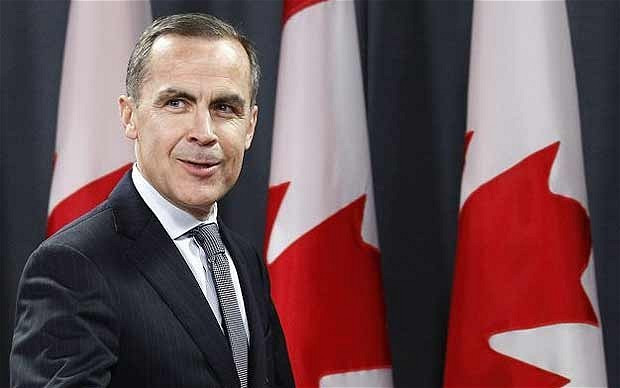New Bank Boss Prioritises Growth

The incoming Governor of the Bank of England Mark Carney has told the World Economic Forum in Davos that he will prioritise economic growth in his new role, but that periods of higher inflation may be the price Britain pays to achieve it.
In his most detailed comments since his appointment was announced in November, Carney said stimulus measures should be kept in place to allow economies to achieve an "escape velocity" that would carry them out of the danger zone of slipping back into recession.
With UK inflation running at 0.7 percent above the government's 2 percent target rate, Carney said there were "tolerances" concerning the speed with which inflation was brought under control in a struggling economy.
While some economists are calling for an interest rate hike to clamp down on inflation, others say rates should stay low while the economy flatlines and public spending falls.
"If you are coming from above the inflation target, and you have a fiscal consolidation, you might take a little longer to get back given the issues with output," Carney said.
"Once the goal is set, the central bank needs to make that determination and there needs to be an understanding of the goals set and of the tolerances that the central bank can operate in."
Pointing to the US, Carney said interest rates could be kept lower for longer, and economic stimulus measures such as quantitative easing extended, to carry the economy safely beyond the danger of recession.
Carney said: "As the economy gains traction, within the context of price stability, the stimulus is continued to be provided entirely appropriately to ensure the US economy achieves escape velocity."
The past year has seen the UK economy fluctuate either side of zero growth, regularly dipping back into recession.
International Monetary Fund managing director Christine Lagarde had said Europe needed a plan for growth in the short and long term.
Paraphrasing German Chancellor Angela Merkel, she said it was no longer enough to say: "We have solved all of our economic problems, now we just have to wait seven years to see the effects."
But Carney disagreed with the OECD secretary general Angel Gurria's view that monetary policy was "maxed out".
He said countries with above-target inflation had some leeway in bringing it under control if domestic recovery was precarious, as it was in the UK.
"There continue to be monetary policy options in all the major economies," he said, but warned that central banks could not do the job on their own.
"There is not an ability for central banks to take all the risks out or set the seeds for a sustainable recovery."
Speculation has mounted that Carney might push to change Britain's 2 percent inflation target in favour of a nominal GDP target that strips out the effects of inflation and prioritises growth.
"It is a decision of the Government," Carney said, adding that the Bank's operational independence was "paramount, in order to achieve the mandate that has been given".
Turning to the lessons that needed to be learned from the banking crisis, Carney said the situation where banks had become "too big to fail" must end.
"The next two years will be decisive in finishing the job on both Basel capital and liquidity and crucially on 'too big to fail'," he said. "Equally important is the forgotten bit of reform, which is addressing shadow banking such as over-the-counter derivatives. These are the areas that absolutely amplified the last crisis and will do so again unless we complete our agenda."
© Copyright IBTimes 2024. All rights reserved.






















